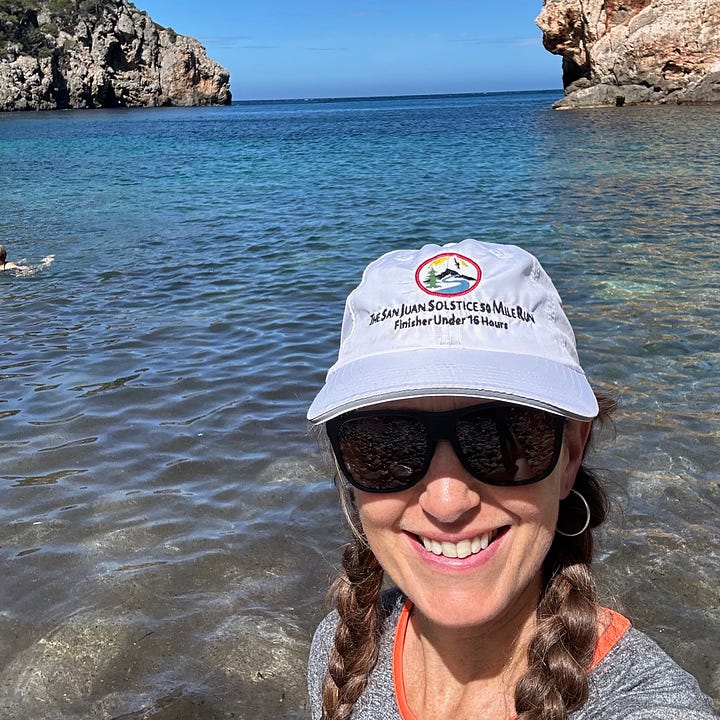Welcome new readers! I had an uptick in subscribers following last week’s popular post. If you’re new here, I hope you’ll spend some time browsing this list of top posts to get familiar with this newsletter’s topics and voice. Also, introduce yourself in the comments if you feel like it.
On Sunday, I published a bonus post for paid subscribers about a family trip to Mallorca last week that had some funny mishaps. I also shared the recording to last month’s online meetup. If you’d like to receive occasional bonus posts and an invitation to a monthly chat, please consider upgrading your subscription to the supporter level.
A training and life update
Two weeks ago, I finished a 22-mile run with confidence, running the final miles strong and feeling as if I could keep going. Last Sunday, however, that confidence evaporated as I skipped running for two days in a row due to travel and fatigue. Scrolling through my friends’ long runs on Strava and then looking at my training log on Sunday night, I felt dismay at my week’s low mileage total (only four short runs totaling 16 miles, ack! I should be logging at least 50!) and a twinge of anxiety about a 100K race that’s three weeks away. I’m not ready and don’t have time to get ready, the thinking went.
Then I recognized that I was experiencing a self-defeating and exaggerated automatic thought and tried to step back and objectively reframe it. I’m sharing this thought process in the context of a training update for any runners reading this who get hyper-focused and rigid about their week-to-week training and also caught in the comparison trap.
During the nearly nine years I had a business as a long-distance running coach, I would develop long-range macro-level training plans for clients to guide the buildup to reach their goals, and then I’d write very specific and individualized weekly plans. At the start of a training block, as we studied the big-picture long-range plan that spanned four to six months, I’d caution them, “This is the best-case scenario for your training, and it probably won’t play out exactly this way. It’s almost inevitable that something—such as illness, or a family or work crisis—will sabotage your training plan for a week or so, and that’s OK, it won’t really affect your preparation. We’ll modify your plan and get your training back on track.”
I needed to remember that advice. I needed to remember that a single missed long run and low-mileage week does not determine readiness for an ultra, because training and preparation are a culmination of months and years at this practice—like a bunch of Legos fitting together to build something, as Paul Terranova once told me, the little pieces as worthy and essential as the big ones. I needed to remember that I avoided Strava for over a decade, and got on it in early 2023 with some trepidation, because I didn’t want to feel FOMO or comparison when looking at others’ posts about their training.
I needed to remember that my identity, health, and self-worth are determined and defined by so much more than how many miles I log and how I perform at races.
Mostly, I felt sad that after a special, fulfilling eight-day family vacation, I would lapse into self-criticism and anxiety about my training—something that normally brings joy and confidence, not stress or self-doubt.
During our vacation to Mallorca, I went on short little runs like a tourist, looking around and soaking in the views and sounds. I ran by feel. I cut my runs short to get back in time to join my family, and I prioritized hikes and other outings with them. I slept in and relaxed. I had a couple of strength and yoga workouts at the hotel gym. In short, I had a restorative, wellness-enhancing week that overall was good for me as a runner.




My short vacation runs last week reminded me of the lesson I relearned last fall while coaching a special student, as described in this post:
He reminded me how to run more by feel than time or distance, and how to be unhurried and noncompetitive. His way of running seemed to imply, “Why rush? Take all the time you need.” It was such a refreshing way to run. He also reminded me to look around—to stop and closely observe interesting things and, in the process, to appreciate the surroundings. He put me back in tune with an exploratory beginner’s mindset.
But then, on Saturday, that relaxed and healthy vacation glow diminished when we spent some 14 hours in planes and airports, spent the night in an airport hotel where I barely slept due to jet lag, and then spent seven hours driving home on Sunday morning from Denver. I’ll hop on the treadmill when I get home, I told myself.
But when we got home, we faced a sizable project of moving things back into place. We had moved everything out to have our floors repaired and refinished while we were away. The workers had put most of the furniture back, but it wasn’t quite right or complete, and everything was dusty from their work. The task of reorganizing and dusting, on top of unpacking and sleep deprivation, made me feel as if I had just run an ultra. I simply didn’t have the energy or desire to fit in a run on Sunday afternoon.
At least, with experience comes self-awareness. I caught and stopped my negative downward spiral of thinking that my training is inadequate, gave myself grace and permission to go two days without running, and recognized the overriding need for sleep. Monday, I started the week fresh with a feel-good 8-miler.
Don’t be so rigid
I had an ah-ha moment Tuesday morning when I read Mario Fraioli’s always worthwhile weekly newsletter, followed by a good, short YouTube yoga session. Marveling at how incredibly tight my posterior chain and adductors felt—I could barely put my legs in a V and bend at the hip—I thought about the value of flexibility in thinking as well as in muscle and joint function.
Mario had a paragraph in his newsletter about disordered eating, with a link to a webpage listing symptoms of RED-S (relative energy deficiency in sports). I’ll reprint it here with his links:
“I’ve written and shared extensively about my own past struggles with disordered eating and body dysmorphia, and while I was never diagnosed—I didn’t see a doctor for my issues, and RED-S wasn’t even called that 20 years ago—I experienced most of the physical and psychological symptoms listed here. Most guys don’t like to talk about this stuff, much less admit to struggling with it, but if you suspect you might be having an issue, please seek out support.”
I clicked through to read Mario’s story and also the symptoms of RED-S. For the most part, I was relieved and reassured that I don’t have symptoms, and I have a healthy relationship with food and my body’s size and image—I love cooking and eating, I don’t count calories, I never go hungry, I don’t put any food off limits, and I love my body, wrinkles and all.
The last part of the list of psychological symptoms got me, however, because I recognized I’m too rigid with my self-imposed don’t-skip-more-than-one-day rule about running, and I’m too hung up on the quantifiable metrics of training. This is the section on psychological symptoms that made me think, hmm, I have some work to do here. It reads:
ANXIETY AROUND EXERCISE/RESTING
How is your relationship with exercise? Do you try to avoid rest days from training or feel an urge to make them “active” rest days? Do you tack on extra training in order to get ahead or cut weight?
Do you find it hard to sit down and truly rest? Do you find yourself sticking rigidly to exercise plans, even if it means ignoring your body's signals, like fatigue or pain?
I found myself saying “yes” to most of the questions (except the one to “cut weight” or the one “do you find it hard to sit down and truly rest?”—no, I love sitting and reading or watching TV). I recognized that I am overly concerned with having some kind of “productive” training daily in the service of weekly training goals. In doing so, I sometimes ignore my body’s signals and go through the motions joylessly.
I needed that vacation—and now, I need to be more flexible with my training and not give in to the urge to make up for a light training week or a missed long run.
If you relate to any of these psychological issues, I hope you can cut yourself some slack and approach your running or any devoted hobby with flexibility. Try to let go of the self-imposed stress and rediscover the joy in it!
Looking ahead, stoked
Feeling fresh in the legs and mind after the light training week and overcoming jet lag, I’m fairly bursting with motivation and optimism about the months ahead. The spring weather is boosting my mood, too (it’s T-shirt weather again!).
Five months, followed by a three-week taper, remain to prepare for my “A” goal of the Grand to Grand Ultra, a self-supported 170-mile weeklong stage race. I scheduled several races over the next few months to use as supported training runs for that main big goal. Most of these events are still open for registration; if you’re interested in them, hit me up with questions. I’d love to encourage others to do them, especially the Grand to Grand.
Leona Divide 100K April 20
Bears Ears 50M June 22
Pacing and crewing my friend, and volunteering, at Hardrock July 12
Never Summer 100K July 27
Grand to Grand Ultra September 22-28
I’m determined to show up to the Grand to Grand in September as healthy, fit, fresh, and prepared as I can be. I’ll try not to base my goals and judge my performance on how I did the prior three times there (2012, ‘14, and ‘19) but rather on who and how I am this year at age 55.
I feel like I’m starting anew and fresh with my training, consciously trying to be more positive and flexible about it. It’s kind of funny how it took a moment of negativity and rigidity to get me back to this better mindset.
For further reading: I recommend this wise and reassuring blog post by coach Jason Koop on the science of “detraining” and what to do if you have to skip several days of your training plan.
As mentioned at the start, please feel free to introduce yourself in the comments below, perhaps sharing a bit about where you live, what you do, and if you’re a runner then what running-related goal(s) you have.
If you’d like to support this newsletter but would rather not commit to a paid subscription, please consider a small donation to my virtual tip jar.




Wow great post hits kinda close to home. I kinda learned to live with my demons and the exercise thing can be a slippery slope. For me I truly think it’s beneficial for the most part but sometimes those body image thoughts still kick in. Thanks for sharing run Yoda . I really appreciate you. Hope to catch you at an ultra one day.
Thank you Sarah for this essay. Like you, I’ve seen how easy it is to fall into negative self-talk as soon as life doesn’t conform exactly to my running plans. What’s amazing is that these are exceptions, yet they can occupy so much valuable mental space. But it’s all a matter of perspective. Nowadays, I remind myself that the most important part of my running is to keep doing it. From that point of view, any minor day-to-day setback is okay, as long as I maintain the practice.